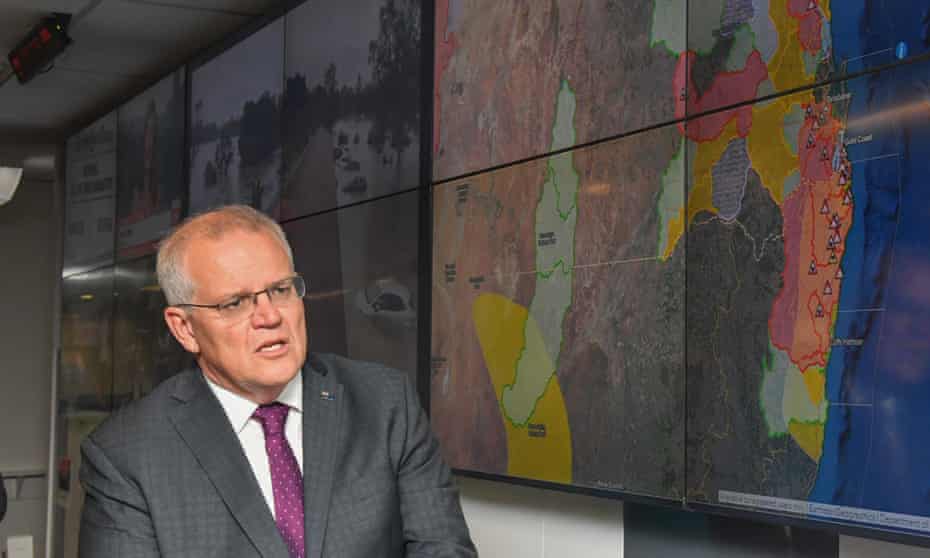Extract from The Guardian
Australia east coast floods 2022
Subsidies to prop up fossil fuel are more pressing for the Morrison government than subsidies for renewables or climate adaptation.

The idea that the Coalition can borrow money to build car parks in marginal seats but must “save up” money to build up an emergency relief fund is absurd. It’s not based on any sound principle of economics, finance or even politics. It’s purely driven by the prime minister’s need for a regular flow of “announceables”.
While the prime minister is in Lismore on Wednesday to declare a national emergency and announce flood funding, Australians – and in particular disaster-stricken communities – are growing tired of his “announce early, announce often” modus operandi.
Scott Morrison’s latest problem is that his rhetorical support for small government has crashed into the climate-changed reality of what communities like Lismore need in the days after their unprecedented floods, and what those in places like Bega are still waiting for years after their unprecedented bushfires.
Australia is one of the richest countries in the world, but while there’s no shortage of money to fund the $16bn-a-year stage three tax cuts for our highest-income earners, when it comes to helping families and businesses recover from the complete devastation of record floods and fires, apparently we need to hasten slowly. Rather than rushing jobkeeper money out the door the way they did to help the likes of Harvey Norman, when it comes to climate-induced disasters it seems the Coalition thinks we need to save for a rainy day.
The problem is that it’s already pouring. Like the CSIRO, the Bureau of Meteorology, the IPCC and the Australian insurance industry, the Morrison government knows that cyclones, storms, floods and fires have already become more common, more intense and more expensive. That’s why they announced a $10bn insurance fund to help subsidise the cost of insurance in politically powerful far-north Queensland.
The National party may house most of the climate sceptics in the federal parliament, but it doesn’t stop them demanding public cash to help their constituents deal with climate impacts.
There is no economic reason the Australian government needs to “save up” billions of dollars in a disaster relief fund. Even if it had wanted to prepare, the time to start saving was back when John Howard was prime minister. If the Coalition knew the disasters were coming (which they did) and thought balancing the budget was important (which they do) then they should have started scrapping fossil fuel subsidies and stockpiling our pennies in their “special funds” decades ago. But now, like firefighters trying to save water during a bushfire, we have a government telling people who are still homeless after the 2020 bushfires to keep waiting.
Things are only going to get worse. Climate change isn’t caused by accident, it takes decades of careful planning and more than $10bn a year in Australian fossil fuel subsidies.
While a carbon price raised a lot of money and reduced a lot of emissions, such economic orthodoxy remains too radical for Australian debate. However, removing the billions of dollars Australia spends on oil, gas and coal subsidies would provide a big price signal and an enormous flow of annual revenue needed for a genuine climate adaptation fund. That is, if we really wanted one.
Likewise, our very profitable, but very lightly taxed resources industry. Qatar, the second biggest exporter of LNG behind Australia, collects 20 times as much tax from their gas exports than we do ours. Australia Institute research estimated that a measly $1 a tonne levy on the carbon dioxide embodied in our fossil fuel exports would raise over $1.5bn a year.
Although the Coalition’s subsidies largesse wasn’t enough to drive a “gas-led recovery”, Putin’s war against Ukraine has certainly filled gas industry coffers. The people of Ukraine and Russia bear the cost of war and sanctions. Companies around the world are walking away from their Russian investments; and yet the share price of Australian frackers has surged.
There is little the Australian government can do to prevent the price of imported petrol from rising, but there’s no reason that our gas exporters need to hang on to the profits that have fallen in their lap. A windfall gains tax on the Australian gas industry is yet another source of revenue that a government that belatedly wants to “stockpile emergency relief funds” could tap. But it won’t.
Just as there is no shortage of money for car parks and income tax cuts, there is no actual shortage of money to help those who have lost everything in recent bushfires or floods.
Who we elect determines what problems we solve. The Coalition has made it clear it believes the “burden” of income tax on those earning over $200,000 a year is more pressing than the burden of whole communities being destroyed. Likewise, it believes that subsidies to prop up the fossil fuel industry are more pressing than subsidies for renewables or climate adaptation. While some bookies have suggested that the voters of Lismore agree with the Coalition’s priorities, time will tell if recent events change their minds.
No comments:
Post a Comment